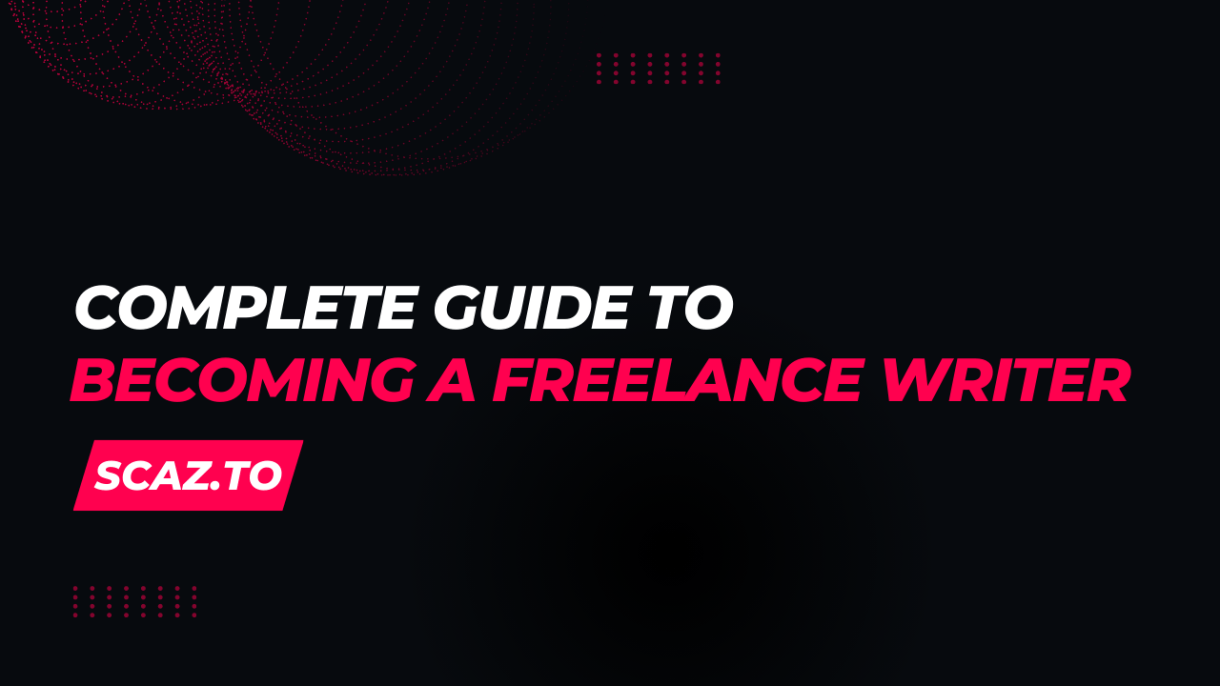If you’re new to freelance writing or want to get started, follow this guide and you’ll be able to avoid many of the mistakes I’ve made over the years.
It took me 7 years of mistakes, failures, and depressing moments to rise from $0 to $5,000 per month as a freelance writer. And I know there are still a lot of writers out there trying to make a few bucks online.
This post is dedicated to you. My no-nonsense guide to what I believe to be the best approach to starting out as a freelance writer the right way.
Step 1: Do You Have What It Takes To Be A Freelance Writer?
Most so-called “experts” and “gurus” make freelancing sound easy and mislead people into believing it is a quick fix for financial problems. A way for you to make some quick money to pay off your bills or to supplement your income while on vacation.
I’m sorry to tell you that if you’re only looking for a quick fix, you’re not going to make it as a freelance writer. Don’t start freelancing for the wrong reasons because you’ll have to put in a lot of effort to make money as a freelancer.
And be prepared to put in a few weeks of hard work with no pay. Because it will not be easy.
To be a successful freelance writer, you must also be passionate about writing. It is not something you are born with, but rather something you learn over time.
For example, if you get bored easily when reading books and long articles, writing may not be the right path for you.
So, before you begin, take a moment to reflect and ask yourself: Do I want to be a freelance writer or am I just looking for a quick fix to my financial problems?
Further Reading:
Step 2: Different Types Of Writing Gigs You Should Know About
Freelance writing is a diverse industry with numerous subcategories. Before you begin, you should be aware of the various types of freelance writing and select the one that best suits you.
Here are a few kinds of freelance writing:
- Copywriting: Copywriting work typically entails writing promotional content for brands, product descriptions, articles for blogs and magazines, and everything in between.
- Article Writing: Writing articles for online publications and blogs is not the same as writing college essays.
- Blog Writing: Writing for blogs entails learning a bit about blogging as well. This includes learning how to use WordPress, SEO, and more.
- eBook Writing: Writing eBooks varies by industry. To be a successful eBook writer, you must first learn about the various types of eBooks.
- Website Content Writing: This primarily entails creating content for website pages such as home pages, product pages, about pages, and so on.
- Ghostwriting: Creating content for others to publish under their own names. This type of work will not be recognized. However, you can charge more for these types of jobs.
- Fiction Writing: This could be the right path for you if you have a creative mind. However, finding freelance fiction writing jobs is difficult.
- Resume and Cover Letter Writing: Another low-demand type of writing.
- Technical Writing: This is the type of writing found on product manuals, agreement terms, and privacy policy pages.
Further Reading:
Step 3: Find Your Niche, But Keep Your Options Open
You can’t call yourself a freelance writer unless you can work in all (or at least the majority) of the categories listed above. Don’t try to be a master of all trades. Rather, be specific about your skills. Narrow it down to a specific niche.
If you’re good at writing eBooks, for example, call yourself a freelance eBook writer. If you’re good at writing essays, you should consider yourself a freelance essay writer.
Narrowing your skills to a specific niche will allow you to gain experience and land jobs more easily. But don’t limit yourself to a specific field. Maintain your options.
For example, the majority of my work entails working with business blogs and writing blog articles to assist in the development of various types of blogs. But I also write eBooks, newsletters, and copywriting whenever I can or feel the need for a change of pace.
Because there will be times when you desperately need the money. During those times, you should be prepared to do any type of writing work.
Further Reading:
Step 4: Learn To Write Like A Pro
For the first three months of developing my first blog, I wrote 15 to 20 articles per day, working nearly 20 hours per day. I pushed myself to the limit. Then I slowed down to writing around 6 to 10 articles per day. This went on for more than four years.
Most of the time, these were short articles of 300 to 500 words. But it was difficult for me at first. My second language is English. I was terrible at it. And I had to learn everything from scratch in order to write for online audiences.
For the first few months, my writing was abysmal. I received a lot of negative feedback and bullying from readers. pointing out my grammatical errors and cracking jokes
But I persisted and continued to write more and more articles. That is the main reason I am where I am today.
Unknowingly, my blog assisted me in practicing the art of writing for online audiences. While I still have a lot to learn about writing, my skills have improved significantly to the point where I can write as well as native English speakers.
What I’m trying to say is that you should practice. Keep practicing regardless of what you believe about your abilities or what others say about your work. You may make errors, but keep writing. You’ll learn as you go.
Malcolm Gladwell states in his book Outliers that it takes 10,000 hours of practice to master a skill. He points out that some of the most famous artists and inventors, such as Bill Gates and Mozart, practiced the same amount to master their skills.
It is not too late to begin practicing.
Step 5: Begin Establishing Your Reputation and Experience
Another advantage of creating my blog was that it served as my portfolio. When a client asked for examples of my work, I simply sent them a link to my blog. It has a significant impact on my success rate.
To begin working as a freelance writer, you no longer need to have your own self-hosted blog. There are other approaches to establishing your reputation.
“If you want to be a writer, you must do two things above all others: read a lot and write a lot.” – Stephen King
The first and most effective strategy is to get published on other well-known blogs. LifeHack, ProBlogger, and Mashable are just a few of the many great blogs that accept guest posts from people other than their writing staff.
Having a few of your articles published on these blogs will help you persuade your clients that you are a skilled writer rather than just claiming to be one.
To get an article published on another blog, you must be an excellent writer. They only accept the best of the best.
So, if you’re just getting started, start with a personal blog on a free platform. Medium is my favorite writing platform. It’s free and increases the visibility of your articles.
Create a personal Medium blog and write about topics related to your niche industry. You can even use your Medium blog as your portfolio if your writing is good.
Additionally, become acquainted with the WordPress platform and learn how to use it. Find out more about Search Engine Optimization. Discover how to format eBooks.
These skills will give you an advantage when submitting proposals to new clients.
Step 6: Hourly Or Fixed Pricing?
The question of whether to charge hourly or per project is one that freelancers have debated for a long time.
It really depends on the nature of your work. Charging an hourly rate, for example, is more appropriate for a copywriter who primarily works on web page copy. A fixed-rate is also appropriate for a blogger who writes articles based on word count.
Pricing, on the other hand, is determined by how fast and skilled you are. For instance, I can write a 1,000-word article on a specific topic in about 30 minutes. If I charged an hourly rate, I would be underpaid for my work.
That is why I always use fixed prices. It’s fair and equal for both the freelancer and the client, and I don’t have to worry about keeping track of my working hours. One less thing to be concerned about.
Step 7: Choose A Platform To Offer Your Services
I’m sure there are experts who will advise you not to offer your services through freelancing platforms. However, I recommend that you use a platform or a job board to find work for the first few months.
We’ve all got to start somewhere, right? And what better place to learn about different types of freelance jobs and what other freelancers are up to than a freelancing platform?
However, you must exercise caution when selecting a platform through which to offer your services. Most beginners take the most obvious route and sign up for the most popular freelancing sites, such as UpWork or Freelancer.com.
You should avoid these platforms. On these sites, there is far too much competition, which will diminish your skills and force you to fall to the level of cheap freelancers who engage in bidding wars to win jobs.
Instead, concentrate on newer and smaller freelance websites and job boards. And I know what you’re thinking: newer and smaller websites don’t get as many clients as larger sites, so how does this help you win more work?
This is similar to identifying your niche. There are fewer freelancers competing for jobs on smaller websites. Furthermore, if you already know how to write killer proposals and have a great reputation, you will be able to land more work even if there are only a few jobs available on that platform.
Step 8: Best Places To Find Freelance Writing Jobs
So, I advised you to avoid popular freelancing platforms like UpWork and Freelancer.com. Also, avoid Fiverr.
But where can you look for work elsewhere?
Actually, there are numerous excellent websites, platforms, and job boards where you can advertise your services and find freelance writing gigs. These are my top recommendations.
- ProBlogger Job Board: A job board that is regularly updated with high-paying freelance writing gigs. Professional writers should use this.
- AngelList: Remote job vacancies posted by startups. High-paying but more difficult work.
- goLance: A fairly new freelancing site with low platform fees.
- RemoteOK: A mix of content and digital marketing jobs. The best option for content marketers.
- Inbound Jobs: Marketing and content writing jobs that are complex. Advanced writers and content marketers should use this platform.
Limit yourself to one job board or platform. Try not to mass-apply for jobs by copying and pasting your proposals. It will be a waste of time.
Further Reading:
Step 9: How To Write A Killer Proposal To Clients
I did a small case study a few months ago by posting a fake job on UpWork and Freelancer. Many freelancers applied, and I learned a lot from their mistakes.
Coming on strong early in their proposals was one of the most common mistakes they made. This makes them appear desperate. They frequently offered extremely low prices for getting the job done.
Professional freelancers would never write proposals in this manner. Here’s an example email template that will show you how it’s done:
Hello, [Client’s Name],
My name is [your name] and I’m a freelance copywriter.
I saw your job posting on [name of the website] and noticed that you are looking for a blog article writer for your company blog.
I’ve been a freelance writer online for [number of years] and have helped develop several great and successful blogs for my clients. Including [names of a few clients with whom you’ve worked].
I’ve also had several articles published on well-known authoritative websites like [mention and link to the websites]. Examine my writing style to see if it fits your blog’s strategy.
I understand that increasing social media shares is just as important as optimizing articles for search engines. And I use a variety of tools to ensure that I target both of those areas.
If you’d like, I can suggest some topics and ideas for great blog posts.
Please let me know if you are interested.
Thank you very much,
[Insert your email signature here]
Step 10: Advice From One Freelance Writer To Another
Even though this strategy worked for me, I cannot guarantee that it will work for you. But if I can do it, so can you!
Keep a few things in mind going forward. Don’t be too greedy if you truly want to succeed and become an exceptional writer. Don’t charge extra for minor extra work you do for your clients.
Be prepared to go the extra mile. Writing an extra 100 words or preparing images for the articles will help you stand out in a crowd of freelance writers.
Concentrate on producing high-quality work every time. Treat every job as if it were your first. Look for ways to satisfy your customers.
Finally, avoid being a jerk. Always be courteous to your clients and keep your cool. Learn to keep your cool when they are criticizing your work or requesting more revisions.
Further Reading:
Conclusion
As you can see, it will take some time to complete all of these steps and begin earning real money. But all of your efforts will be rewarded.
Create a personal portfolio website for yourself while working from freelance websites and job boards. This website will assist you in gradually transitioning away from relying on job boards and toward receiving offers directly from clients via email.
When a client inquires about the type of work I do or wants to see examples of my work, I send them a link to my personal website.
Continue to improve yourself and never stop learning. It will determine your success!


